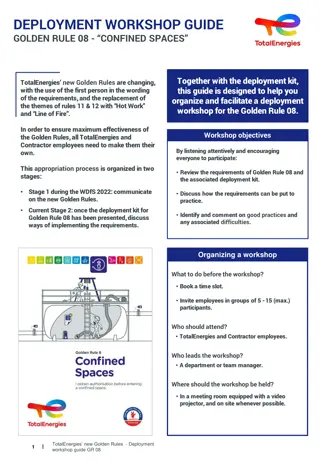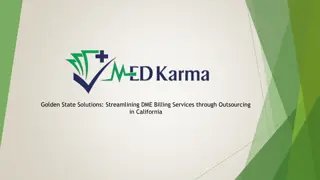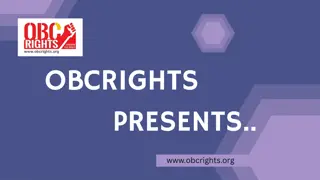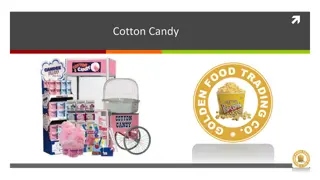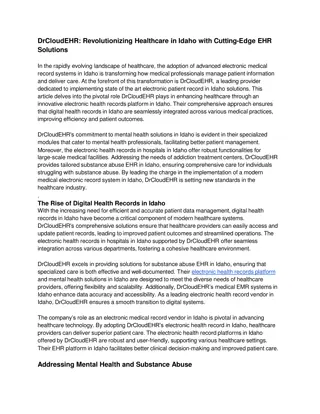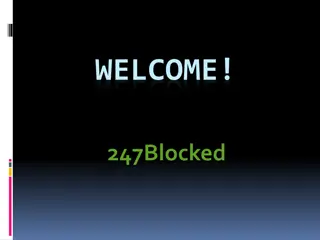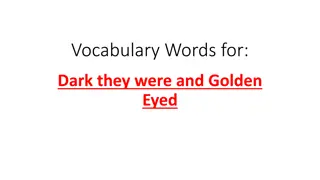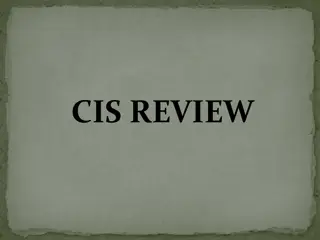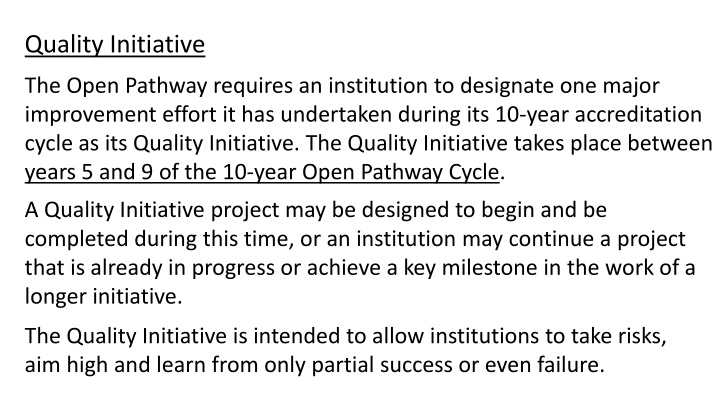
Quality Initiative in Higher Education Accreditation Process
Learn about the Quality Initiative requirement in the 10-year accreditation cycle, including project timelines and options for institutions to propose their improvement efforts. Explore different forms a Quality Initiative can take and examples of initiatives institutions can undertake in the higher education accreditation process.
Download Presentation

Please find below an Image/Link to download the presentation.
The content on the website is provided AS IS for your information and personal use only. It may not be sold, licensed, or shared on other websites without obtaining consent from the author. If you encounter any issues during the download, it is possible that the publisher has removed the file from their server.
You are allowed to download the files provided on this website for personal or commercial use, subject to the condition that they are used lawfully. All files are the property of their respective owners.
The content on the website is provided AS IS for your information and personal use only. It may not be sold, licensed, or shared on other websites without obtaining consent from the author.
E N D
Presentation Transcript
Quality Initiative The Open Pathway requires an institution to designate one major improvement effort it has undertaken during its 10-year accreditation cycle as its Quality Initiative. The Quality Initiative takes place between years 5 and 9 of the 10-year Open Pathway Cycle. A Quality Initiative project may be designed to begin and be completed during this time, or an institution may continue a project that is already in progress or achieve a key milestone in the work of a longer initiative. The Quality Initiative is intended to allow institutions to take risks, aim high and learn from only partial success or even failure.
Where is Southeastern on the time Where is Southeastern on the time- -line? line? YEAR 4: Assurance Review- COMPLETED! lnstitution--Submit Assurance Filing (Assurance Argument and Evidence File) by May 14,2018. Peer Review--Conduct Assurance Review (no visit). HLC Decision Making--Acceptance of or action on Assurance Review. YEARS 5-7: Quality Initiative Proposal- We are in year 6! Institution--Submit Quality Initiative Proposal no later than August 31 of Year 7 (2021). May also begin preparing Assurance Filing for Year 10 comprehensive evaluation. Peer Review--Review Quality Initiative Proposal. (takes 8-12 weeks, resubmission may be required) YEARS 7-9: Quality Initiative Report Institution--Submit Quality Initiative Report no later than August 31 of Year 9 (2023). May also continue preparing Assuring Filing for Year 10 comprehensive evaluation. Peer Review--Review Quality Initiative Report. YEAR lO: Comprehensive Evaluation Institution--Submit comprehensive evaluation materials (late Fall 2023 or early Spring 2024). Peer Review--Conduct comprehensive evaluation (with visit) in Spring 2024. HLC Decision Making--Take action on comprehensive evaluation and Reaffirmation of Accreditation.
Choosing a Quality Initiative https://www.hlcommission.org/Accreditation/quality-initiative.html The Quality Initiative can take one of three forms: 1) The institution designs and proposes its own Quality Initiative to suit its present concerns or aspirations.
2) The institution choose an initiative from a menu of topics, such as the following examples: -The institution undertakes a broad-based self-evaluation and reflection leading to revision or restatement of its mission, vision, and goals. -The institution joins with a group of peer institutions, which it identifies, to develop a benchmarking process for broad institutional self-evaluation. -The institution undertakes a multi-year process to create systemic, comprehensive assessment and improvement of student learning. -A four-year institution joins with community colleges to create a program of dual admission, joint recruitment and coordinated curriculum and student support. -The institution pursues a strategic initiative to improve its financial position. -The institution pursues a campus action project or new partnership that promotes civic awareness, community change or service learning. -*The institution engages in an HLC-endorsed program or process offered by another agency, such as the Foundations of Excellence program offered by the Gardner Institute for Excellence in Undergraduate Education or the LEAP Initiative offered by the Association of American Colleges and Universities.
3) The institution chooses to participate in an HLC-facilitated program. Currently, HLC has two such programs, the Assessment Academy and Student Success Academy. https://www.hlcommission.org/Programs-Events/assessment-academy-experience.html The Assessment Academy provides a structured, mentor-facilitated program aimed at advancing and accelerating an institution s efforts to assess student learning. HLC is now accepting applications for the Spring 2020 Assessment Academy. The Academy framework consists of in-person events, on-campus activities, online project updates and virtual consultations that help institutions design and implement a customized project to improve learning through assessment. Four year project, fees totaling: $30,000 PLUS costs of regular travel for a 5 person team.
Whatever approach (1,2,or 3)- The Most Common Topics: Student success (including Foundations of Excellence and focus on persistence and completion) Assessment of student learning Online/mobile Learning (including Quality Matters) Organizational planning Unit or program review (our POAR reporting system fits here) Developing a quality culture Cultural competency
Peer Review Process: A panel of two outside HLC peer reviewers must approve. 1) Sufficiency of the Initiative s Scope and Significance -Potential for significant impact on the institution and its academic quality. -Alignment with the institution s mission and vision. -Connection with the institution s planning processes. -Evidence of significance and relevance at this time. 2) Clarity of the Initiative s Purpose -Clear purposes and goals reflective of the scope and significance of the initiative. -Defined milestones and intended goals. -Clear processes for evaluating progress. 3) Evidence of Commitment to and Capacity for Accomplishing the Initiative -Commitment of senior leadership. -Commitment and involvement of key people and groups. -Sufficiency of the human, financial, technological and other resources to the plan and timeline. -Defined plan for integrating the initiative into the ongoing work of the institution and sustaining its results. -Clear understanding of and capacity to address potential obstacles. 4) Appropriateness of the Timeline for the Initiative
Quality Initiative discussions so far: Involvement across campus in discussing choosing the topic for QI. Sept. 11, 2019- Attended Zoom conference sponsored by OSRHE and the Gardner Institute. Meeting with Bryon Clark, Tim Boatmun, Jennifer Maple, and Marlin Blankenship to discuss potential of the Pedagogy, Advising, and Curricular Excellence (PACE) project with the Gardner Institute as QI. *Ruled out due to length (3 years), costs ($20,000+ with travel), and implementation (extensive data collection and reporting software) in consideration of a new President coming in as well as the workload of staff/faculty being high already with the new ERP (Colleague). Sept. 16, 2019- Executive Team meeting presentation Sept. 11, 2019- Department Chair meeting discussion Sept. 24, 2019- Discussion with on campus HLC Peer-Reviewers (Dr. Cotter-Lynch, Dr. Daigle, Dr. Hardy) Sept. 26, 2019- Discussion with Outreach Campus Coordinators (staff) **Sept. 30, 2019- Shared Governance Faculty Senate Forum presentation the QIP

![❤[READ]❤ Robotic Exploration of the Solar System: Part I: The Golden Age 1957-19](/thumb/21623/read-robotic-exploration-of-the-solar-system-part-i-the-golden-age-1957-19.jpg)






